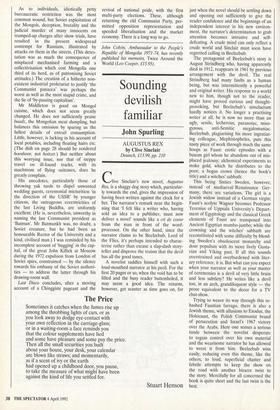Sounding devilish familiar
John Spurling
AUGUSTUS REX by Clive Sinclair Deutsch, £1 3.99, pp. 210 Clive Sinclair's new novel, Augustus Rex, is a shaggy dog story which, particular- ly towards the end, gives the impression of having been written against the clock for a bet. The narrator's remark near the begin- ning that `I felt like a writer who, having sold an idea to a publisher, must now deliver a novel' sounds like a cri de coeur from the man in front of the word- processor. On the other hand, since the narrator claims to be Beelzebub, Lord of the Flies, it's perhaps intended to charac- terise rather than excuse a slap-dash story- teller and disprove the truism that the devil has all the good tunes.
A novelist saddles himself with such a loud-mouthed narrator at his peril. For the first 20 pages or so, when the void has to be filled and the busy reader buttonholed, it may seem a good idea. The returns, however, get scanter as time goes on, for just when the novel should be settling down and opening out sufficiently to give the reader confidence and the beginnings of an independent interest in his new environ- ment, the narrator's determination to grab attention becomes intrusive and self- defeating. A crude mind can only reflect a crude world and Sinclair must soon have regretted calling in Beelzebub.
The protagonist of Beelzebub's story is August Strindberg who, having apparently died in 1912, reappears in 1961 by previous arrangement with the devil. The real Strindberg had many faults as a human being, but was intermittently a powerful and original writer. His response to a world new to him, though not to the reader, might have proved curious and thought- provoking, but Beelzebub's simulacrum hardly notices it. No longer a practising writer at all, he is now no more than an ugly, senile, lecherous, paranoiac, miso- gynous, anti-Semitic megalomaniac. Beelzebub, plagiarising his more ingratiat- ing colleague, Mephistopheles, puts this nasty piece of work through much the same hoops as Faust: erotic episodes with a buxom girl whom he abandons out of mis- placed jealousy; alchemical experiments to make gold, which he distributes to the poor; a bogus crown (hence the book's title) and a witches' sabbath.
This being Sixties Sweden, however, instead of mediaeval/ Renaissance Ger- many, there are variations. The girl is a Jewish widow instead of a German virgin; Faust's acolyte Wagner becomes Professor Terenius of Uppsala University's Depart- ment of Egyptology and the classical Greek elements of Faust are transposed into Ancient Egyptian mumbo-jumbo; while the crowning and the witches' sabbath are reconstituted with some difficulty by blend- ing Sweden's obsolescent monarchy and dour populism with its more lively Gusta- vian and Viking past. If all this sounds overstrained and overburdened with liter- ary reference, it is. But what can you expect when your narrator as well as your master of ceremonies is a devil of very little brain and less subtlety? He writes like a devil too, in an arch, grandiloquent style — the prose equivalent to the decor for a TV chat-show.
Trying to weave its way through this re- hashed Faustian farrago, there is also a Jewish theme, with allusions to Exodus, the Holocaust, the Polish Communist brand of persecution and Israel's 1967 victory over the Arabs. Here one senses a serious tussle between the novelist desperate to regain control over his own material and the wearisome narrator he has allowed to wrest it from him. Beelzebub wins easily, reducing even this theme, like the others, to loud, superficial chatter and febrile attempts to keep the show on the road with another bizarre twist to the story. Mercifully for all concerned the book is quite short and the last twist is the best.


























































 Previous page
Previous page